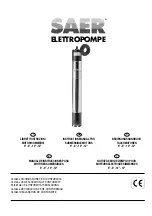
12
Zur Kupplung des Tauchmotors an die Pumpe:
Den Motor in die vertikale Lage bringen, so dass der Vorstand der Welle nach oben weist, und während der Phase des Ankuppelns so blockieren,
dass er sich nicht bewegen oder herabfallen kann. Die Pumpe mit einem Kran oder einer Winde anheben, über den Motor bringen und die
Zentrierung mit den entsprechenden Flanschen vornehmen; anschließende mit den mitgelieferten Schrauben befestigen.
Para acoplar el motor sumergible a la bomba:
Colocar el motor en posición vertical, con la parte saliente del eje dirigida hacia arriba, y bloquearlo, de manera que durante la fase de acoplamiento
no pueda moverse o caer. Levantar la bomba con una grúa o un aparejo y colocarla sobre el motor, efectuando el centraje de las respectivas
bridas y apretando luego con los tornillos suministrados.
Sopalancando con un destornillador en la junta de acoplamiento de los dos ejes, verificar que la bomba presente un poco de huego axial.
Pour accoupler le moteur immergé et la pompe :
Positionner le moteur à la verticale, l’extrémité de l’arbre tournée vers le haut et le bloquer pour que, pendant la phase d’accouplement, il ne puisse
ni bouger ni tomber. Soulever la pompe avec une grue ou un palan et la poser sur le moteur, centrer les brides respectives et serrer les vis fournies
avec l’appareil.
Faire levier avec un tournevis sur le joint d’accouplement des deux arbres et s’assurer que la pompe présente un peu de jeu axial.
5.
CAVO DI ALIMENTAZIONE - POWER SUPPLY CABLE - NETZKABEL - CABLE DE ALIMENTACIÓN - CABLE D’ALIMENTATION
La scelta dei cavi di alimentazione, che collegano il motore al quadro di comando e controllo è operazione di notevole importanza, in quanto questi
elementi devono soddisfare tre condizioni fondamentali:
1) Il cavo deve essere idoneo al lavoro in ambienti bagnati e deve avere una classe di isolamento superiore alla tensione nominale dell’impianto.
2) Il valore di portata del cavo deve essere superiore al valore della corrente di carico, valore che è uguale alla corrente nominale del motore
quando questo è del tipo a tre cavi terminali, ed è uguale al 58% della corrente nominale del motore quando questo è del tipo a sei cavi terminali.
3) La caduta di tensione lungo il cavo di alimentazione deve essere contenuto entro limiti ristretti, (max 5%).
Durante la scelta del cavo si deve tenere in particolare considerazione l’ambiente d’installazione e le condizioni di posa previste, queste infatti
influiscono sulle caratteristiche del cavo e ne possono provocare lesioni. Nel caso dell’allacciamento dei motori sommersi la posa può considerarsi
in cunicolo, per il tratto di salita lungo il pozzo e a parete o area per il tratto esterno, in entrambi i casi l’ambiente deve comunque considerarsi
umido/bagnato e per questo la normativa richiede l’impiego di cavo con guaina esterna.
The choice of the power supply cables for the connection of the motor to the control panel, is extremely important, as these parts must fulfil three
fundamental requirements:
1) The cable must be suitable for operation in wet environments and its class of insulation must be above the nominal voltage for the system.
2) The capacity of the cable must be in excess of the charge current; this value is equal to the nominal current of the motor for the type with three
terminal wires, and is equal to 58% of the nominal current of the motor for the type with six terminal wires.
3) Voltage drops along the power supply line must be contained to within strict limits (max 5%)
When choosing the cable, it is important to take into account the planned place of installation and operating conditions. These are important for the
specifications of the cable and can damage it. For the connection of submersible motors, the operating conditions can be considered to be in a
shaft for the ascending part in the well, and on a wall or aerial for the external part; in both cases, the environment must be considered to be damp/
wet and therefore regulations require the use of cables with external sheathing.
Die Wahl der Netzkabel, mit denen der Motor an die Steuertafel angeschlossen wird, ist von entscheidender Bedeutung, da diese Elemente den
drei folgenden Anforderungen genügen müssen:
1) Das Kabel muss für den Einsatz in feuchten Umgebungen geeignet sein und eine Isolierungsklasse aufweisen, die über der Nennspannung der
Anlage liegt.
2) Der Wert des Durchsatzes des Kabels muss über dem Stromwert der Last liegen; dieser Wert entspricht dem Nennstrom des Motors, falls dies
ein Motor mit drei Anschlusskabeln ist, und er entspricht 58 % des Nennstroms des Motors, wenn der Motor sechs Anschlusskabel aufweist.
3) Beim Spannungsabfall entlang des Kabels müssen in besonderer Weise die Installationsumgebung sowie die Art der Verlegung des Kabels
berücksichtigt werden, da sich diese Faktoren auf die Eigenschaften des Kabels auswirken und Beschädigungen verursachen können. Beim
Anschluss der Tauchmotoren kann von einer Verlegung im Schacht ausgegangen werden, für den ansteigenden Abschnitt im Schacht und an der
Wand oder in der Luft für den Außenbereich; in beiden Fällen muss die Umgebung als nass/feucht angesehen werden und daher schreibt die
Norm die Verwendung eines Kabels mit externem Mantel vor.



























